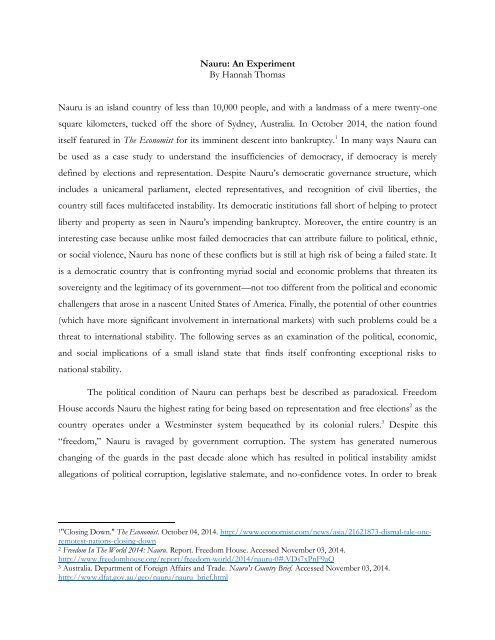Journal of Political Inquiry Fall 2014
You also want an ePaper? Increase the reach of your titles
YUMPU automatically turns print PDFs into web optimized ePapers that Google loves.
Nauru: An Experiment<br />
By Hannah Thomas<br />
Nauru is an island country <strong>of</strong> less than 10,000 people, and with a landmass <strong>of</strong> a mere twenty-one<br />
square kilometers, tucked <strong>of</strong>f the shore <strong>of</strong> Sydney, Australia. In October <strong>2014</strong>, the nation found<br />
itself featured in The Economist for its imminent descent into bankruptcy. 1 In many ways Nauru can<br />
be used as a case study to understand the insufficiencies <strong>of</strong> democracy, if democracy is merely<br />
defined by elections and representation. Despite Nauru’s democratic governance structure, which<br />
includes a unicameral parliament, elected representatives, and recognition <strong>of</strong> civil liberties, the<br />
country still faces multifaceted instability. Its democratic institutions fall short <strong>of</strong> helping to protect<br />
liberty and property as seen in Nauru’s impending bankruptcy. Moreover, the entire country is an<br />
interesting case because unlike most failed democracies that can attribute failure to political, ethnic,<br />
or social violence, Nauru has none <strong>of</strong> these conflicts but is still at high risk <strong>of</strong> being a failed state. It<br />
is a democratic country that is confronting myriad social and economic problems that threaten its<br />
sovereignty and the legitimacy <strong>of</strong> its government—not too different from the political and economic<br />
challengers that arose in a nascent United States <strong>of</strong> America. Finally, the potential <strong>of</strong> other countries<br />
(which have more significant involvement in international markets) with such problems could be a<br />
threat to international stability. The following serves as an examination <strong>of</strong> the political, economic,<br />
and social implications <strong>of</strong> a small island state that finds itself confronting exceptional risks to<br />
national stability.<br />
The political condition <strong>of</strong> Nauru can perhaps best be described as paradoxical. Freedom<br />
House accords Nauru the highest rating for being based on representation and free elections 2 as the<br />
country operates under a Westminster system bequeathed by its colonial rulers. 3 Despite this<br />
“freedom,” Nauru is ravaged by government corruption. The system has generated numerous<br />
changing <strong>of</strong> the guards in the past decade alone which has resulted in political instability amidst<br />
allegations <strong>of</strong> political corruption, legislative stalemate, and no-confidence votes. In order to break<br />
1"Closing Down." The Economist. October 04, <strong>2014</strong>. http://www.economist.com/news/asia/21621873-dismal-tale-oneremotest-nations-closing-down<br />
2 Freedom In The World <strong>2014</strong>: Nauru. Report. Freedom House. Accessed November 03, <strong>2014</strong>.<br />
http://www.freedomhouse.org/report/freedom-world/<strong>2014</strong>/nauru-0#.VDs7xPnF9aQ<br />
3 Australia. Department <strong>of</strong> Foreign Affairs and Trade. Nauru's Country Brief. Accessed November 03, <strong>2014</strong>.<br />
http://www.dfat.gov.au/geo/nauru/nauru_brief.html

















